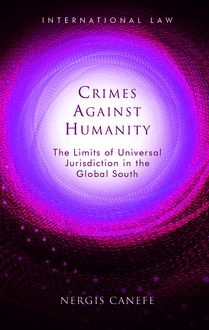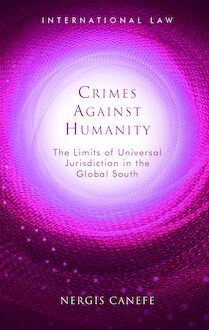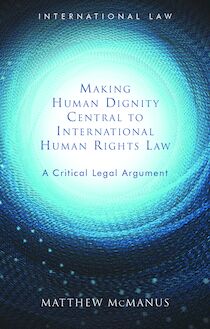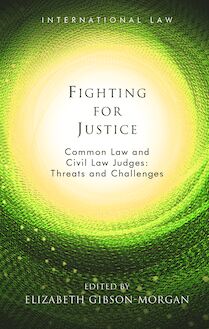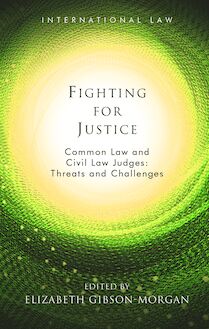-
 Univers
Univers
-
 Ebooks
Ebooks
-
 Livres audio
Livres audio
-
 Presse
Presse
-
 Podcasts
Podcasts
-
 BD
BD
-
 Documents
Documents
-
- Cours
- Révisions
- Ressources pédagogiques
- Sciences de l’éducation
- Manuels scolaires
- Langues
- Travaux de classe
- Annales de BEP
- Etudes supérieures
- Maternelle et primaire
- Fiches de lecture
- Orientation scolaire
- Méthodologie
- Corrigés de devoir
- Annales d’examens et concours
- Annales du bac
- Annales du brevet
- Rapports de stage
La lecture à portée de main
Vous pourrez modifier la taille du texte de cet ouvrage
Découvre YouScribe en t'inscrivant gratuitement
Je m'inscrisDécouvre YouScribe en t'inscrivant gratuitement
Je m'inscrisEn savoir plus
Vous pourrez modifier la taille du texte de cet ouvrage
En savoir plus

Description
This is a time when the rule of law is seriously challenged, when governments threaten deliberately to break the law, and the independence of justice is jeopardised by unrelenting pressure from both the executive and the media. This book aims at contributing to restoring trust in judges as custodians of the law and justice, through a comparison between Civil and Common Law countries. It offers a rare opportunity to gather the expertise of eminent judges and legal authorities from five different countries, providing a unique insight into their work and the way they deliver justice based on their respective professional experience and practise of the law. Far from being a highly technical debate between experts, however, the book is accessible to students and the general public, and raises important contemporary legal issues that involve them both as citizens, with justice as a shared aspiration, and a common attachment to the rule of law.
List of Abbreviations
Introduction: Judges’ common threats and challenges, Elizabeth Gibson-Morgan
Part One: Judicial Independence
Chapter One: Reflections on judges in civil law and common law countries, Lord Judge
Chapter Two: A Customary Scale of Punishment; Judicial Sentencing in England and Wales, Victor Bailey
Chapter Three: National perceptions of Judges and Lawyers in the UK, Matthias Kelly
Chapter Four: Judicial independence in Spain, Ana Maria Neira-Pena and David Soto Diaz
Part Two: Judicial Diversity
Chapter Five: Diversity and Judicial Independence in Denmark, Peter Gjørtler
Chapter Six: Diversity and Judicial Independence in Quebec and Canada, Michel Morin
Part Three: Access to Justice
Chapter Seven: Judging access to justice: the case of the United Kingdom and France, Géraldine Gadbin-George
Chapter Eight: Demystifying the laws and the work of judges in Wales, Milwyn Jarman
Part Four: Judicial training reform
Chapter Nine: The status and influence of judges of France and of common law jurisdictions: Recruitment, training and reform, Winston Roddick
Chapter Ten: The Declaration of Judicial Training Principles: Judicial Training ‘as part of the judicial role’, Benoît Chamouard
Conclusion: Elizabeth Gibson-Morgan
Bibliography
Index
Sujets
Informations
| Publié par | University of Wales Press |
| Date de parution | 15 juin 2021 |
| Nombre de lectures | 0 |
| EAN13 | 9781786837486 |
| Langue | English |
Informations légales : prix de location à la page 0,3450€. Cette information est donnée uniquement à titre indicatif conformément à la législation en vigueur.
Extrait
INTERNATIONAL LAW
F IGHTING FOR J USTICE
Series Editors
Diane Marie Amann
University of Georgia
Yvonne McDermott
Swansea University
Editorial Board
Simon Chesterman
National University of Singapore
Fiona de Londras
University of Birmingham
Fionnuala Ní Aoláin
Queens University, Belfast and University of Minnesota
Ryszard Piotrowicz
Aberystwyth University
Volker Roeben
University of Dundee
Carsten Stahn
Leiden University
INTERNATIONAL LAW
F IGHTING FOR J USTICE
Common Law and Civil Law Judges: Threats and Challenges
Edited by
E LIZABETH G IBSON -M ORGAN
© The Contributors, 2021
All rights reserved. No part of this book may be reproduced in any material form (including photocopying or storing it in any medium by electronic means and whether or not transiently or incidentally to some other use of this publication) without the written permission of the copyright owner except in accordance with the provisions of the Copyright, Designs and Patents Act 1988. Applications for the copyright owner’s written permission to reproduce any part of this publication should be addressed to the University of Wales Press, University Registry, King Edward VII Avenue, Cathays Park, Cardiff, CF10 3NS.
www.uwp.co.uk
British Library CIP Data
A catalogue record for this book is available from the British Library.
ISBN: 978-1-78683-746-2
eISBN: 978-1-78683-748-6
The right of The Contributors to be identified as authors of this work has been asserted in accordance with sections 77 and 79 of the Copyright, Designs and Patents Act 1988.
The publisher has no responsibility for the persistence or accuracy of URLs for any external or third-party internet websites referred to in this book, and does not guarantee that any content on such websites is, or will remain, accurate or appropriate.
Cover image © Freepik
In memory of my father
Series Preface
Challenges to the independence of the judiciary have mounted alongside the rise in numerous countries around the world of populism and authoritarianism. Meanwhile, in the United Kingdom and elsewhere, the Covid-19 pandemic has hastened a move towards remote systems of judging and also a call for the reform of jury trials. Concurrently, the global Black Lives Matter movement has brought into sharp focus issues around the lack of representativeness on judicial benches.
In this fraught context, this edited volume could not be more timely. It is a well-placed addition to the International Law series, which aims to publish dynamic and cutting-edge research in international law, with a strong focus on legal theory. Elizabeth Gibson-Morgan should be commended for bringing together this collection of essays, in which esteemed contributors from academia, the judiciary, and legal practice analyse important themes of judicial independence, diversity of the bench, access to justice, and judicial training reform. The chapters provide essential comparative insights from five countries: the United Kingdom, Denmark, France, Spain, and Canada. The result, a coherent and well-argued defence of the rule of law internationally, will serve as an important reference work for many years to come.
Professor Diane Marie Amann University of Georgia Professor Yvonne McDermott Swansea University
Contents
Acknowledgements
List of Abbreviations
Notes on the Contributors
Introduction: Judges’ Common Threats and Challenges Elizabeth Gibson-Morgan
PART I: Judicial Independence
1 Reflections on Judges in Civil Law and Common Law Countries
Lord Judge
2 ‘A Customary Scale of Punishment’: Judicial Sentencing in England and Wales
Victor Bailey
3 National Perceptions of Judges and Lawyers in Common Law and Civil Law Countries
Matthias Kelly
4 Judicial Independence in Spain
Ana María Neira Pena and David Soto Diaz
PART II: Judicial Diversity
5 Diversity and Judicial Independence in Denmark
Peter Gjørtler
6 Diversity and Judicial Independence in Quebec and Canada
Michel Morin
PART III: Access to Justice
7 Judging Access to Justice: The Case of the United Kingdom and France
Géraldine Gadbin-George
8 Demystifying the Laws and the Work of Judges in Wales
Milwyn Jarman
PART IV: Judicial Training Reform
9 The Status and Influence of Judges of France and of Common Law Jurisdictions: Recruitment, Training and Reform
Winston Roddick
10 The Declaration of Judicial Training Principles: Judicial Training ‘as Part of the Judicial Role’
Benoît Chamouard
Conclusion
Elizabeth Gibson-Morgan
Bibliography
Notes
Acknowledgements
It all started with a one-day conference devoted to judges in common law and civil law countries organised at the Bordeaux Law School on 16 March 2018. This location was chosen because of its unique legal tradition, as the city of Montesquieu, and the only one outside Paris to have a branch of the National Judicial Training College – the École Nationale de la Magistrature . The main objective was to bring would-be judges and senior judges from various countries together to share, for the former their expectations, for the latter their long experience of the practice of the law, in order to understand better what being a judge today means, what the main challenges and potential threats are.
Rather than focusing exclusively on national legal identities and legal traditions, the discussions showed both the importance of and attachment to common values and legal principles, most notably the rule of law. They also revealed shared concerns regarding the future of judicial independence, access to justice, diversity in the judiciary and the reform of justice.
My gratitude first goes to all those who contributed to the success of this event, and in particular Lord Judge. His expertise, accessibility and kindness were greatly appreciated and made it a memorable day. I would also like to thank all those who later added their own expertise and thoughts through their written contributions to this volume, thus prolonging the reflection on those key topical issues. I am truly grateful to Professor Valérie Malabat, the Head of the Institut de Sciences Criminelles et de la Justice (ISCJ), my research centre in Bordeaux, and Professor Evelyne Bonis-Garçon, the Head of the Institute of Legal Studies ( Institut d’Études Judiciaires ) for having made the Bordeaux event possible and for their continuous support.
I would also like to thank my students for their enthusiasm for the law and also for the joy they bring me as an academic. This book partly aims at strengthening them in their judicial career choice and in keeping the flame alive.
Last but not least, my thanks go to the University of Wales Press, and in particular Sarah Lewis for her patience, encouragement and professionalism.
I would like to dedicate this book to my late father, Derek Gibson, who attended the Bordeaux conference, then passed away a few months later. He held until the end a passion for justice.
Elizabeth Gibson-Morgan Oxford, June 2020
List of Abbreviations
ADR
Alternative Dispute Resolution
BAME
Black, Asian, Minority Ethnic
CAB
Citizens Advice Bureau
CETA
Comprehensive Economic and Trade Agreement
CGAE
Consejo General de la Abogacía Española (General Council of Spanish Lawyers)
CGPJ
Consejo General Poder Judicial (General Council of the Judiciary)
CJC
Canadian Judicial Council
CPS
Crown Prosecution Service
DPP
Director of Public Prosecutions
ECHR
European Convention on Human Rights and Fundamental Freedoms
EEA
European Economic Area
EGA
Estatuto General de la Abogacía (the Federal Lawyers’ Regulations)
ENM
École Nationale de la Magistrature /(French Judicial Training College)
EU
European Union
HMCTS
Her Majesty’s Courts and Tribunals Service
HMOC
Her Majesty’s Online Court
IEHC
Supreme Court of Ireland
IOJT
International Organisation for Judicial Training
JAAB
Judicial Appointments Advisory Board (Republic of Ireland)
JAP
Judicial Appointments Commission (England and Wales)
QC
Queen’s Counsel
LASPO
Legal Aid, Sentencing and Punishment of Offenders Act 2012
LCJ
Lord Chief Justice
LGBTQ2
Lesbian, Gay, Bisexual, Transgender, Queer, Two-Spirit
LOPJ
Ley de orientación y programación de la justicia (the Act organising and planning the justice system)
MIAM
Mediation Information and Assessment Meeting
PIMMS
Points Information Mediation Multi-Services/Multi-Service Mediation Information Points
SCC
Supreme Court of Canada
SIAC
Special Immigration Appeals Commission
TTIP
Transatlantic Trade and Investment Partnership
UKSC
United Kingdom Supreme Court
USM
Union Syndicale des Magistrats (French Trade Union of Judges)
Notes on the Contributors
Victor Bailey is a Distinguished Professor of Modern British History at the University of Kansas, who has developed an expertise in the history of crime, policing and punishment. He is a prolific author. His latest book is entitled The Rise and Fall of the Rehabilitative Ideal, 1895–1970 (London: Routledge, 2019).
Benoît Chamouard is a former French judge and currently the Deputy Director of the French National School for the Judiciary (ENM) and Head of the International Department.
David Jose Soto Diaz is a law graduate of the University of A Coruña, Spain and a member of the Research group on Criminology, Legal Psychology and Criminal Justice in the Twenty-first Century. His research focuses on the European Court of Justice, globalisation and the judiciary, as well as Investor State Dispute Settlement.
Géraldine Gadbin-George is a former Avocat at the Paris Bar, a French judge and English solicitor. She is currently Professor-elect in Legal English and English Law at the University of Panthéon-Assas, France.
Elizabeth Gibson-Morgan (editor) is Professor in Law and Languages at the University of Poitiers, and at the Bordeaux Law School. She is a Senior Research Fellow in Constitutional Law at King’s College, London. Her current research is on House
-
 Univers
Univers
-
 Ebooks
Ebooks
-
 Livres audio
Livres audio
-
 Presse
Presse
-
 Podcasts
Podcasts
-
 BD
BD
-
 Documents
Documents
-
Jeunesse
-
Littérature
-
Ressources professionnelles
-
Santé et bien-être
-
Savoirs
-
Education
-
Loisirs et hobbies
-
Art, musique et cinéma
-
Actualité et débat de société
-
Jeunesse
-
Littérature
-
Ressources professionnelles
-
Santé et bien-être
-
Savoirs
-
Education
-
Loisirs et hobbies
-
Art, musique et cinéma
-
Actualité et débat de société
-
Actualités
-
Lifestyle
-
Presse jeunesse
-
Presse professionnelle
-
Pratique
-
Presse sportive
-
Presse internationale
-
Culture & Médias
-
Action et Aventures
-
Science-fiction et Fantasy
-
Société
-
Jeunesse
-
Littérature
-
Ressources professionnelles
-
Santé et bien-être
-
Savoirs
-
Education
-
Loisirs et hobbies
-
Art, musique et cinéma
-
Actualité et débat de société
- Cours
- Révisions
- Ressources pédagogiques
- Sciences de l’éducation
- Manuels scolaires
- Langues
- Travaux de classe
- Annales de BEP
- Etudes supérieures
- Maternelle et primaire
- Fiches de lecture
- Orientation scolaire
- Méthodologie
- Corrigés de devoir
- Annales d’examens et concours
- Annales du bac
- Annales du brevet
- Rapports de stage
